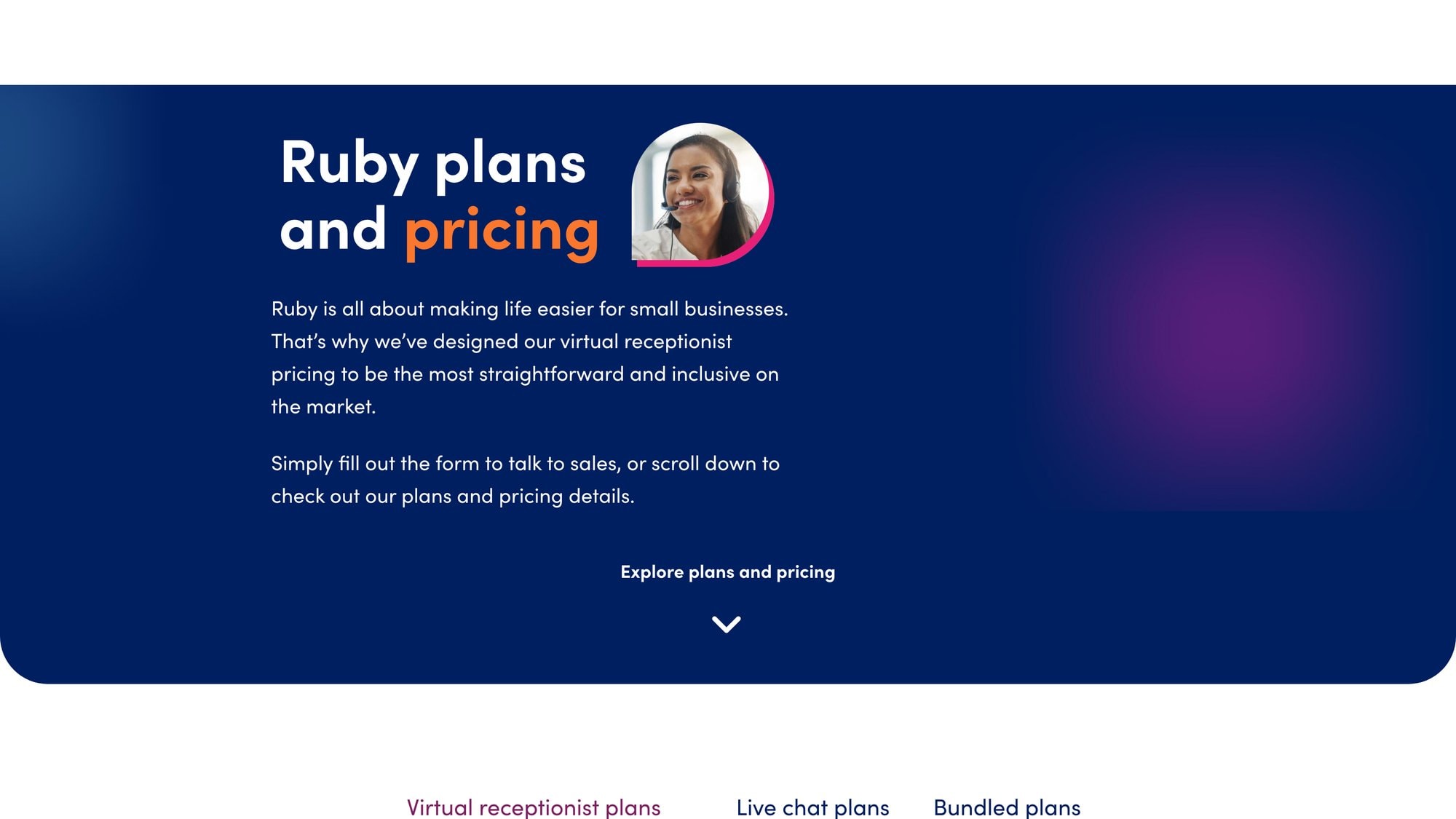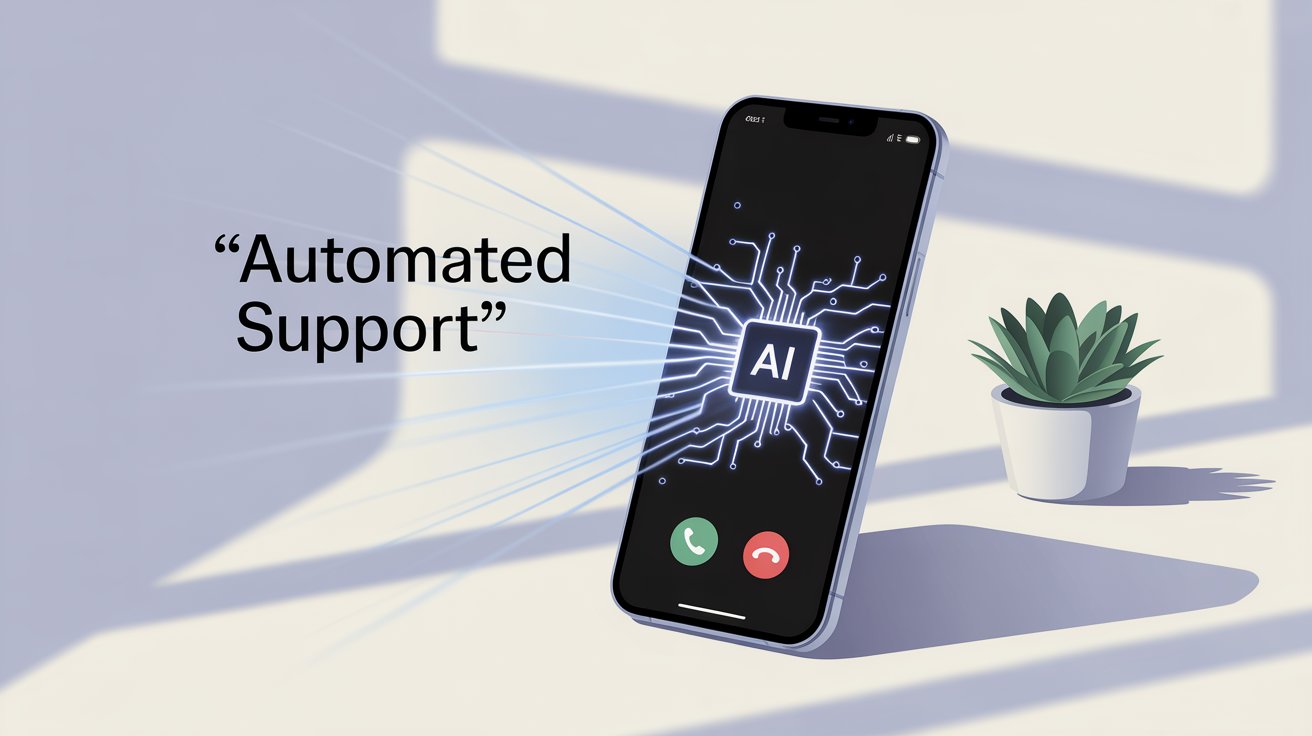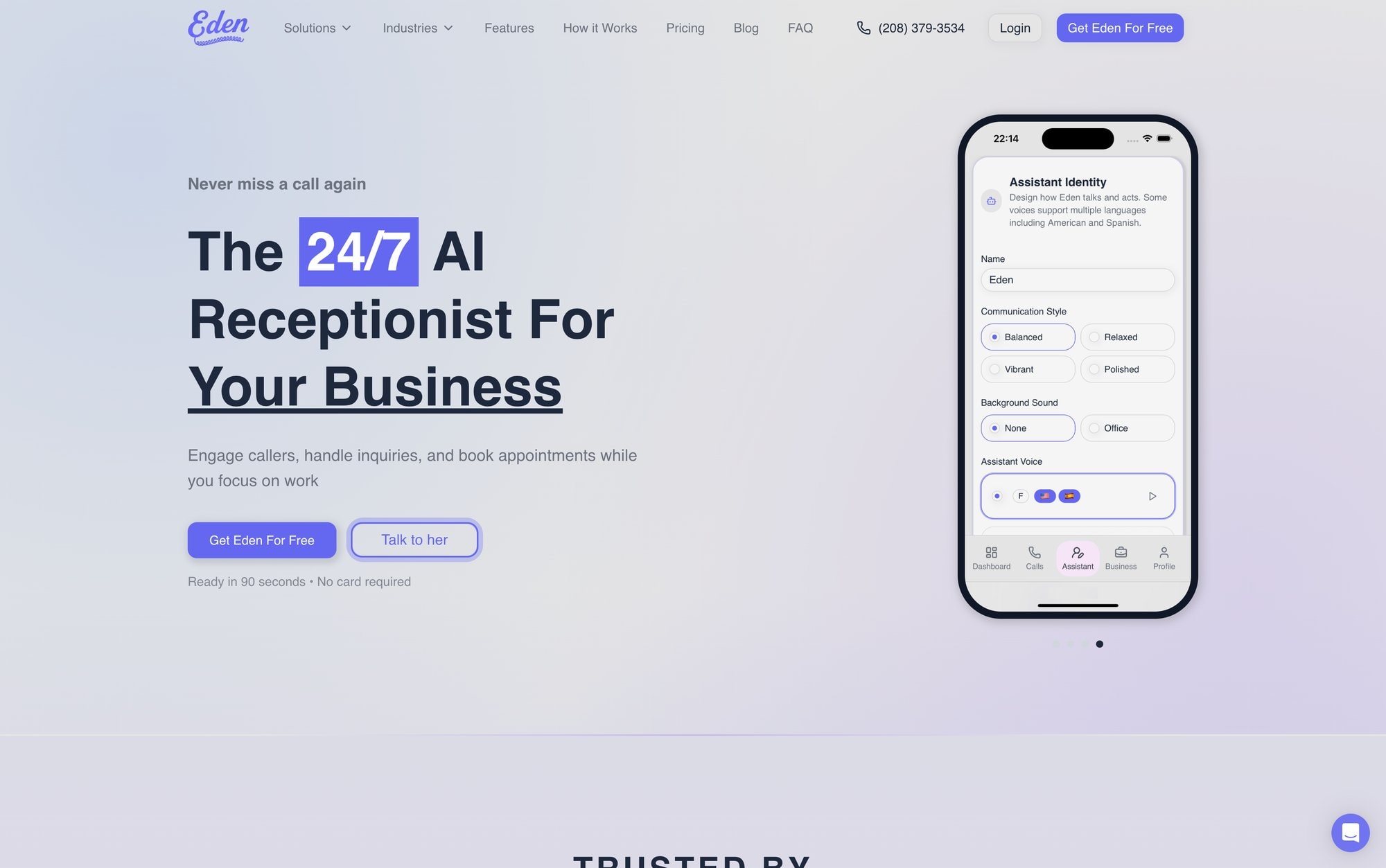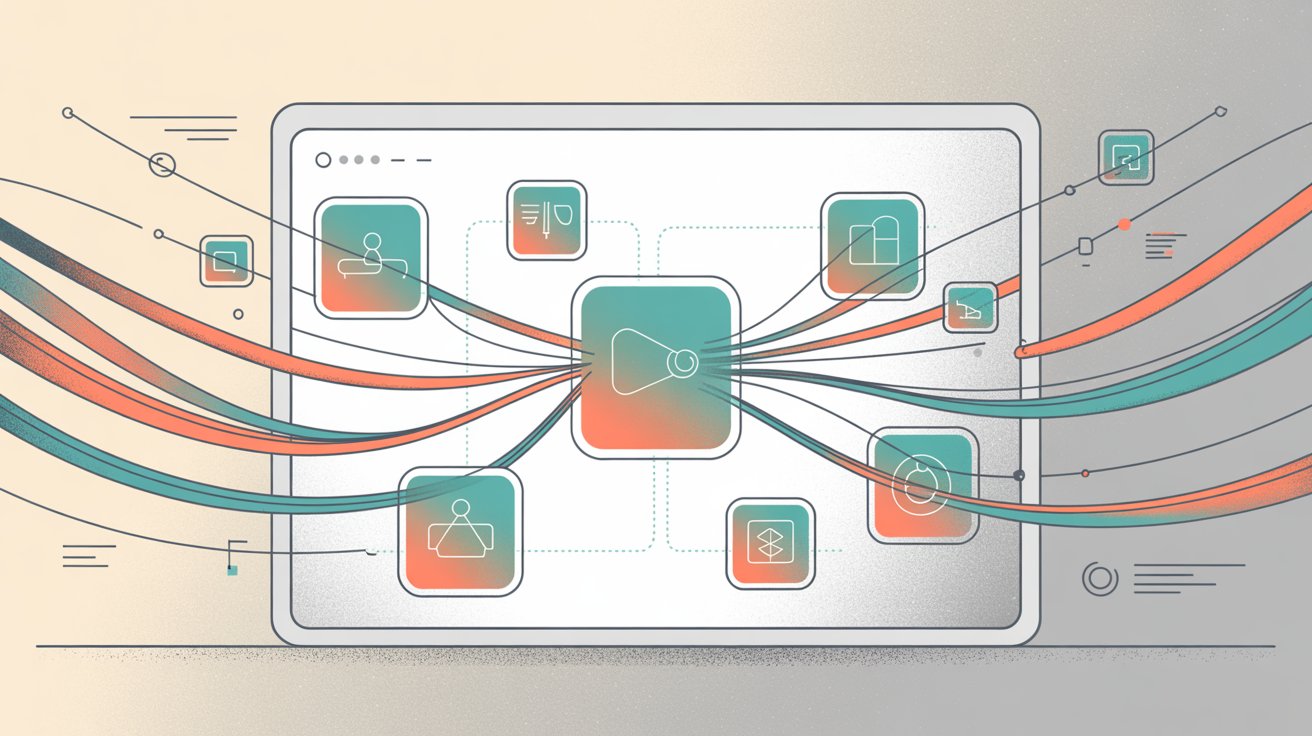Ruby Receptionists vs AI Receptionist (2025)
Ruby Receptionists costs $245-$1,695/month. AI receptionists start at $39/month with unlimited plans at $99. Compare features, pricing, and ROI.
November 19, 2025

Missed calls cost small businesses more than we'd like to admit. You probably know the feeling: your phone rings while you're with a customer, in a meeting, or honestly just trying to eat lunch. By the time you're free, the caller's moved on. They've already dialed the next business on their list.
Research shows that about 80% of callers won't leave a voicemail. They just hang up and call someone else. That's not a minor inconvenience. That's direct revenue walking out the door.
So you start looking at solutions. Two options dominate the conversation: Ruby Receptionists, the established human answering service that's been around since 2003, and the newer AI receptionist platforms like Eden that promise similar coverage at a fraction of the cost.
Both claim to solve your missed call problem. Both promise 24/7 coverage. But they work in completely different ways, and the price gap between them is significant enough to make you wonder what you're really paying for.
This guide breaks down the actual differences. Not marketing fluff, just the real trade-offs you need to understand before choosing.
What Do You Get with Ruby Receptionists?#
Ruby built its reputation on one simple promise: every call gets answered by a real, trained person.
Think of Ruby as an extension of your team. When someone calls your business number, it rings through to a Ruby receptionist (based in the U.S.) who answers using your custom greeting. To the caller, it sounds like they've reached your office directly. Most won't realize they're talking to an outside service.
Core features you get with every Ruby plan:
• True 24/7 human coverage – No extra fees for nights, weekends, or holidays. Ruby's team works in shifts to cover all hours.
• Customized call handling – You provide instructions on what to say, what info to collect, and how to handle different call types. Their receptionists follow your script.
• Appointment scheduling – Ruby integrates with Google Calendar and practice management software to book appointments during calls.

• Live call transfers – When a call needs your immediate attention, Ruby can do warm transfers to your line or an on-call team member.
• Detailed message intake – Their receptionists are trained to qualify leads and gather information. For law firms, that might mean a full new client questionnaire. For contractors, it's capturing the service needed and urgency level.
• Bilingual support (English/Spanish) – Available at no extra cost. When a Spanish-speaking caller reaches Ruby, they'll be connected to a bilingual agent (there might be a brief hold while that agent comes on the line).
• Outbound calling – Ruby can make calls on your behalf to confirm appointments or return calls to clients.
They also handle payment collection through secure links and filter obvious robocalls. For medical or legal clients, Ruby offers HIPAA-compliant processes.
Ruby's pricing structure (2025 rates):
The plans are tiered by how many receptionist minutes you get per month. Every minute a Ruby agent spends on the phone (incoming or outgoing) counts toward your allotment:
| Plan | Monthly Cost | Minutes Included | Cost Per Minute |
|---|---|---|---|
| Starter | $245 | 50 | ~$4.90 |
| Grow | $385 | 100 | ~$3.85 |
| Elevate | $705 | 200 | ~$3.53 |
| Pro | $1,695 | 500 | ~$3.39 |
All plans include the same features. The only difference is your minute allowance. Go over your limit and you'll pay overage fees.

One thing to note: Ruby bills in 30-second increments, rounded up. A 1-minute, 10-second call becomes 1.5 minutes on your bill. This includes spam calls and wrong numbers, unless Ruby successfully filters them first.
Who actually benefits from Ruby?
Businesses that prioritize the human touch and have the budget for it. If your callers are dealing with sensitive issues (think family law cases, medical concerns, emotional decisions), a human's ability to show empathy and adapt to the conversation builds trust in a way that automation struggles to match.
Ruby's receptionists excel at making genuine connections and giving callers a warm first impression of your business. The setup is also dead simple: forward your phones, give them your instructions, and you're done. No scripting required.
But that premium service comes with premium costs. Even Ruby's entry-level plan at $245/month for just 50 minutes (less than an hour of call time) puts it out of reach for many small businesses. If your call volume grows, your costs scale right along with it.
Which brings us to the automated alternative.
How Do AI Receptionists Work?#
An AI receptionist isn't a phone tree where you press 1 for sales.
It's a conversational AI system that picks up your calls and talks to callers in natural language, handling many of the same tasks a human receptionist would.
Instead of "Press 1 for this, press 2 for that," callers just speak. The AI asks questions, answers inquiries from your knowledge base, and takes action based on what the caller needs.
Modern AI receptionist platforms (like Eden, and others) are designed to understand free-form speech and respond appropriately.

What AI receptionists can handle:
→ 24/7 availability with zero downtime – Software doesn't take breaks or go home for the holidays. Every call gets answered instantly, whether it comes in at 2 PM or 2 AM.
→ FAQ handling from your knowledge base – Load the AI with your business information, and it can answer questions about hours, service areas, pricing, or anything else you've configured.
→ Lead qualification and intake – Program custom questionnaires specific to your industry. A law firm's AI might ask what type of case the caller has and which court it's in. A contractor's AI would capture the service needed, location, and urgency.
→ Real-time appointment booking – Direct integration with Google Calendar lets the AI check your availability, offer open slots to the caller, and book appointments on the spot. Confirmation gets sent automatically.
→ Smart call routing – Set rules for when calls should transfer to you or your team. If someone says "burst pipe" (plumber) or "arrested" (law firm), the AI can immediately connect them to an on-call number. Routine calls just result in a message being taken.
→ Instant call summaries and full transcripts – After each call, you get an SMS/email with the caller's info and what they needed. Full recordings and transcripts are available for review. This gives you complete visibility into every conversation.
→ Aggressive spam blocking – AI can automatically detect and block robocalls, hanging up on known spam numbers before they waste your time. Some systems let you block all toll-free numbers or specific area codes.
The goal is to mimic what a human receptionist does, but through software. The voices are natural enough that many callers won't realize it's AI unless they're specifically listening for it.
The catch: It's automated, which means it may struggle with heavy accents, poor connections, or callers who provide information in unexpected ways. There's also the empathy gap. An AI can be programmed to say "I'm sorry you're dealing with that," but it won't sound the same as a human who genuinely understands your frustration.
Research shows over 70% of consumers prefer speaking with a live person, but much of that sentiment comes from bad experiences with old-school phone trees. Modern AI is conversational, not menu-driven, which helps. But some callers will always want to hear a human voice, especially when they're dealing with something urgent or emotional.
For routine interactions, AI can actually delight callers. Someone calling to book an appointment or check your hours just wants quick service. An AI that handles their request in 30 seconds with no hold time often beats getting transferred around by a human operator.
Ruby Receptionists vs AI Receptionist: Cost Comparison#
Budget is where this comparison gets really interesting.
The gap between Ruby's pricing and AI receptionist pricing is significant enough to reshape how you think about call coverage.
Ruby's math:
As we covered earlier, Ruby starts at $245/month for 50 minutes. A more realistic plan for steady call volume (200 minutes, roughly 3-4 hours of calls) runs $705/month.
You pay for every minute, including spam and wrong numbers. Billing rounds up in 30-second blocks, so costs can be unpredictable if call volumes fluctuate.
If you need more than 500 minutes, you're looking at custom pricing well into the thousands per month.
AI receptionist pricing:
AI services typically range from $50 to $300 per month, often with unlimited or very high usage limits. Even the most feature-rich AI plans usually cost less than Ruby's entry-level offering.
Here's what various AI platforms charge:
| Provider | Monthly Cost | What You Get |
|---|---|---|
| Eden | Starting at $39 | 200 minutes on Plus plan; Pro ($99) includes unlimited minutes |
| Other AI platforms | ~$49-270 | Various minute or call-based limits |
Do the math on Eden's Plus plan: $39/month for 200 minutes versus Ruby's $705/month for the same 200 minutes. That's not a 2× difference. It's more than 18× cheaper.
And Eden's Pro plan at $99/month includes unlimited calling. Pay the same $99 whether you get 10 calls or 300 calls. With Ruby, doubling your call volume means doubling your bill.

Why the massive price gap?
Software scales easily. An AI system can handle 1 call or 1,000 concurrent calls without meaningfully higher costs. Human receptionists need salaries, benefits, training, and management. Those costs get passed to you as per-minute charges.
The savings add up fast:
A typical small business spending $500/month with Ruby could get comparable (or better) AI coverage for $50-100/month. That's $4,800-$5,400 saved per year. Over three years, you're looking at $14,000-$16,000 in savings.
For many small businesses, that's the cost of hiring an employee, upgrading equipment, or funding a real marketing campaign.
24/7 Call Coverage: Which Solution Scales Better?#
Both Ruby and AI receptionists advertise round-the-clock availability, but achieving it works differently.
Ruby's approach:
Ruby employs teams working in shifts to ensure someone answers at all hours. No matter when a call comes in (midnight on Thanksgiving, 3 AM on a Sunday), a trained receptionist picks up.
Ruby can also handle multiple calls at once. If two people call your number simultaneously, two different Ruby agents answer on their end. So in theory, the service scales.
But costs scale with volume. If your calls double, you need a bigger plan or you'll rack up overages. During a busy month, you might blow through your allotted minutes in two weeks and face surprise charges.
And while Ruby has a large pool of receptionists, extremely high call volumes during peak times might mean slightly longer wait times before someone picks up.
AI's approach:
An AI receptionist runs on servers. It never sleeps, never calls in sick, and doesn't need breaks. There's no extra cost for after-hours coverage because there's no concept of "hours" for software.
Scalability is essentially unlimited.
If 10 people call at the exact same moment, the system spins up 10 concurrent AI instances to handle them simultaneously. Something a single human (or even a small team) could never do.

If your business suddenly gets 5× the calls next month, the AI handles it without breaking stride. And if you're on an unlimited plan, your bill doesn't change.
Critical insight: This elasticity is huge for growing businesses or those with unpredictable call spikes. A roofing contractor during storm season, an accountant during tax time, a retailer during the holidays... AI just absorbs the volume.
The trade-off:
Ruby gives you a human touch even at 3 AM. The receptionist might not know your business as intimately as your in-house staff would, but they're a real person following your instructions.
AI gives you perfect consistency and capacity. At 3 AM, it follows the exact same programmed behavior as at 3 PM. You can even configure different responses for after-hours calls ("Our office is currently closed, but I can take your information and we'll call you first thing tomorrow morning").
If you foresee rapid growth or heavy seasonal spikes, AI won't keep you up at night worrying about per-minute costs or whether enough agents are available.
Caller Experience: Human Warmth vs Instant Efficiency#
Your customers don't care about your internal operations.
They care about how it feels to call your business.
The Ruby experience:
Ruby's core promise is that callers speak to a real, friendly person every time. There's genuine value in human empathy and flexibility.
A skilled receptionist picks up on tone and urgency. If a caller sounds panicked, they get extra patience and reassurance. Humans can also handle unstructured conversations much better than AI. If someone goes off-script or has a complex question, the receptionist can improvise.
Ruby receptionists are trained to sound like they're part of your team, not a distant call center. They build rapport. ("Oh, your AC went out? That must be so frustrating. Let me get your details so our technician can call you right back.")
For industries where trust and personal connection are critical (legal, medical, high-end services), this human touch makes a real difference.
But there's variability. Different receptionists have different styles. Ruby will follow your script, but Agent A might be chattier than Agent B. You won't always get the exact same tone. Ruby does allow you to provide pronunciation guides (for names, etc.) and preferred greetings, but you're entrusting your brand's first impression to whoever picks up. In general Ruby gets high marks for professionalism, but it won't be as perfectly uniform as a programmed AI voice. Also, humans may have to put callers on brief hold to look up information or transfer to a bilingual agent.
The AI experience:
A well-designed AI uses a professional, natural-sounding voice. It greets callers with your custom introduction and handles requests efficiently.
Many callers these days are comfortable with voice assistants. If the AI understands them and provides helpful responses quickly, they don't mind that it's automated. In straightforward scenarios (scheduling an appointment, asking about hours, requesting a quote), an AI that books them immediately often leads to very satisfied callers.
Challenges exist, though. AI can struggle with heavy accents, poor connections, or rambling callers. When it doesn't understand something, the AI might give a generic answer or ask the caller to repeat themselves. These friction points reveal the automation and can frustrate people.
One advantage: AI is never tired or annoyed. Every caller gets the same friendly demeanor. No risk of a receptionist having a bad day. And AI is perfectly consistent. If you choose a professional tone and specific greeting, it's delivered exactly that way on every single call.
Ruby provides personal warmth that AI can't fully replicate. A receptionist can chit-chat if the caller initiates it, or express genuine empathy about a home repair emergency.
But AI can personalize in a data-driven way. If integrated with your CRM and the caller's number is recognized, the AI could say, "Hi John, thanks for calling back. Are you following up on your appointment scheduled for Tuesday?" That kind of instant context is hard for human services where different agents answer each time.
The reality:
If your business deals with emotionally charged or complex calls (a law firm with distressed clients, a medical office discussing sensitive info), the human warmth from Ruby is hard to beat.
For routine interactions (booking a service appointment, checking business hours, getting a quote), a well-configured AI receptionist can delight callers with instant service and zero hold times.
Many businesses find that blending both works well. AI handles the first line of defense for efficiency, with a human backup for when someone explicitly asks to speak to a person or when the AI isn't sure how to help.
How Do They Integrate with Your Business Tools?#
Both solutions need to fit into how you actually run your business.
Ruby's integration options:
Ruby provides an online dashboard and mobile app where you can review messages, see call logs, and update instructions in real time.
Direct integrations exist primarily for the legal field. Ruby syncs with Clio, Rocket Matter, and MyCase at various levels. For most other connections, Ruby relies on third-party automation tools.
Want call data to flow into your CRM or send alerts to Slack? You'll need to set up automation workflows, which requires a subscription and some technical comfort.
Ruby's scheduling often works through their own booking tool or by integrating with your calendar system. They can also make outbound calls on your behalf (to confirm appointments or follow up with clients), which is a unique human service that AI platforms generally don't offer.
AI receptionist integrations:
AI platforms are built with modern APIs and integrations in mind.

-
Calendar systems: Direct Google Calendar integration is standard. The AI checks your real-time availability and books appointments instantly during calls.
-
CRM and industry software: Eden and similar platforms offer APIs for pushing call data into other systems.
-
Automated follow-up: AI can automatically send callers a follow-up text with directions to your office, a scheduling link, or a thank-you message. These actions trigger based on call context without manual intervention.
-
Analytics dashboards: Many AI platforms show call trends, peak call times, common questions, and conversion metrics. Since it's all software, the data is structured and easy to analyze.
Customization and control:
With AI, you have granular control over the call flow. You design exactly what the AI says, what questions it asks, and in what order. Some platforms offer visual script builders; others let you upload FAQs.
This requires more initial setup than Ruby (which just needs basic instructions for their human agents to follow naturally). But it also means you can ensure callers get the precise experience you want.
Making updates:
Need to change business hours or update a promotion? With AI, you edit your settings in the dashboard and the changes take effect immediately on all calls.
With Ruby, you update your instructions and their system alerts receptionists to the changes. But you're relying on each human to absorb that update. There's room for someone to miss the memo and give outdated information. AI never forgets once you've updated the configuration.
Compliance and security:
For businesses with compliance requirements (HIPAA, confidentiality), both Ruby and reputable AI services address these concerns.
Ruby offers HIPAA-compliant service if you sign a Business Associate Agreement with them. Their staff receive privacy training.
AI services can be programmed to automatically redact sensitive information or avoid asking for certain data types. Transcripts are stored digitally, so verify that your chosen provider encrypts data and maintains proper security protocols.
Ruby Receptionists vs AI: Pros and Cons#
Let's break this down without the marketing spin.
| Ruby Receptionists | AI Receptionists |
|---|---|
| ✓ What Works | ✓ What Works |
| Real human empathy – Genuine warmth and understanding that automation can't fully replicate | Dramatically cheaper – Plans often under $100/month, sometimes with unlimited usage |
| Handles complex conversations – Can think on their feet when callers have unusual requests | True 24/7 unlimited capacity – Can handle 10 simultaneous calls as easily as 1 |
| Zero setup headaches – Forward your phones, give basic instructions, and you're done | Perfect consistency – Delivers the exact experience you programmed every single time |
| Outbound calling – Can make calls on your behalf for confirmations and follow-ups | Instant responses – No hold times or "let me check that" delays for routine questions |
| Proven track record – Established since 2003 with thousands of satisfied clients | Complete records – Every call transcribed and logged for easy searching and quality monitoring |
| Rich integrations – Direct calendar/CRM connections with automated data flow | |
| Aggressive spam blocking – Can filter robocalls automatically | |
| Instantly updatable – Change scripts or settings and they take effect immediately | |
| ✗ The Downsides | ✗ The Downsides |
| Expensive – Plans range from $245 to $1,695+ per month, far higher than AI alternatives | No real empathy – Can't provide genuine emotional support in sensitive situations |
| Pay-per-minute billing – Every call (including spam) eats into your allotted minutes | Understanding limitations – May struggle with complex questions, heavy accents, or tangents |
| Costs scale with volume – More calls always means a bigger bill | Some callers prefer humans – Particularly older adults or those with urgent emotional needs |
| Consistency varies – Different agents might handle calls with slightly different styles | Requires setup – You need to configure call flows, input FAQs, and test the system |
| Limited customization – You can't script exact conversation flows | Edge cases need handling – Must have a plan for when AI can't help (message taking, transfer to backup) |
| Integration gaps – Relies heavily on third-party automation; no full call transcripts by default |
Which Receptionist Solution Is Right for Your Business?#
The honest answer depends on what you're optimizing for.
Choose Ruby if:
You're in a field where personal service is non-negotiable. If clients expect a concierge-level experience or regularly have emotionally sensitive inquiries, the human touch matters. Some businesses feel more comfortable knowing a real person handles their calls, especially if each call is high-stakes.
If you get relatively low call volume (under an hour or two monthly) but each conversation requires nuance and empathy, Ruby's quality might justify the cost.
Choose AI if:
Coverage, speed, and cost are your priorities. For a fraction of Ruby's price, you get 24/7 answering with zero missed calls. AI is especially compelling for small businesses, startups, and solo professionals who need to project a responsive image without spending hundreds monthly.
If your calls tend to be straightforward (scheduling, basic questions, lead intake), callers just want efficient service. AI delivers that instantly.
Consider a hybrid approach:
Many businesses use AI as the primary answering system to handle routine tasks and capture leads. If a caller presses a certain option or explicitly asks for a person, the call forwards to a human (either your team or a lower-cost backup service).
This gives you cost savings and instant AI response for most calls, with a human safety net for those who need it.
Industry examples:
-
Law firms often use AI for after-hours calls and new client intake because the cost savings are dramatic and it captures leads 24/7. Firms using AI see 30-40% better conversion on after-hours calls compared to voicemail. Some firms pair that with human receptionists during business hours for existing client calls.
-
Home services contractors (plumbers, electricians, HVAC) benefit hugely from AI because it can field multiple emergency calls simultaneously at 2 AM. Someone with a burst pipe just wants an immediate answer. AI delivers that while a human service might have them waiting in a queue.
-
Medical offices sometimes prefer human services because patients calling in distress value hearing a compassionate voice. Though many medical practices also use AI to route after-hours calls to on-call staff based on keywords.
Why Eden Is the Smart Alternative to Ruby Receptionists#
We built Eden because we saw too many small businesses choosing between two extremes: expensive human services they couldn't afford, or cheap phone trees that frustrated callers.
AI technology has matured to the point where it can handle real conversations. Not the "press 1 for sales" experience everyone hates, but actual dialogue where callers speak naturally and get helpful responses.

Our approach:
-
Natural conversation – Callers talk to Eden like they would a person. No button pressing.
-
Instant 24/7 coverage – Every call gets answered in seconds, whether it's 2 PM or 2 AM.
-
Real-time appointment booking – Direct Google Calendar integration means Eden checks your availability and books appointments during the call, with automatic confirmations sent to the caller.
-
Bilingual English/Spanish support – Seamless language switching without hold times.
-
Smart spam filtering – IntelliSpam automatically blocks robocalls so you only get real customer calls.
-
Detailed transcripts and summaries – Every conversation recorded and searchable. You'll know exactly what each caller needed.
-
Affordable pricing – Our Plus plan starts at $39/month for 200 minutes. Pro ($99/month) includes unlimited calling.
Setup takes about five minutes. You provide your business info, configure your greeting and key FAQs, then forward your phones to your Eden number. That's it.
Try Eden with our 30-minute free trial and see how it handles your actual calls. No credit card required.
Frequently Asked Questions#
How much does Ruby Receptionists cost compared to AI receptionists?
Ruby's plans range from $245/month (50 minutes) to $1,695/month (500 minutes). AI receptionists like Eden start at $39/month for 200 minutes, with unlimited plans available around $99/month. AI solutions are typically 5-10× cheaper for comparable call volume.
Can AI receptionists understand accents and different languages?
Modern AI receptionists handle various accents reasonably well, though they can struggle with very heavy accents or poor phone connections. For language support, most AI platforms offer bilingual English/Spanish capabilities with instant switching (no hold time). Ruby offers the same languages but may require a brief hold to connect you with a bilingual agent.
Will my customers know they're talking to an AI?
With a well-configured AI receptionist, many callers won't notice unless they're specifically listening for it. The voices sound natural and professional. If the AI doesn't understand something or the caller asks complex questions, it may become apparent. If that's a concern, you can configure the AI to transfer to a human when requested.
What happens when AI can't answer a question?
Most AI receptionists are programmed with fallback options. If the AI doesn't understand or can't help, it will typically say something like "Let me take your information and have someone call you back shortly," then capture the caller's details. You can also set up transfer rules to send certain types of calls directly to a human.
Do I need technical skills to set up an AI receptionist?
No. Modern AI receptionist platforms like Eden are designed for non-technical users. Setup usually involves providing your business information, writing a custom greeting, and uploading common FAQs. Most platforms offer templates and industry-specific presets to make it even easier. Initial setup typically takes 5-15 minutes.
Can AI receptionists book appointments into my calendar?
Yes. AI receptionists integrate directly with Google Calendar. During a call, the AI can check your real-time availability, offer open time slots to the caller, and book the appointment immediately. Confirmation details get sent to the caller automatically via email or text.
How do these services handle spam and robocalls?
Both Ruby and AI services offer spam filtering. Ruby's human agents can identify and dismiss obvious spam, but those calls still count toward your minutes. AI receptionists often have more aggressive spam blocking, using caller ID databases and pattern recognition to automatically hang up on suspected robocalls before they eat into your usage. Eden's IntelliSpam filter can block entire categories like toll-free numbers if those tend to be spam for your business.
What happens if my call volume suddenly increases?
With Ruby, higher call volume means you'll need a larger plan or you'll face overage charges. If you're on a 200-minute plan and suddenly get 400 minutes of calls, you'll pay extra. With AI (especially on unlimited plans), volume increases don't affect your bill. The system simply handles more concurrent calls without additional cost.
Can I use both a human service and AI together?
Absolutely. Many businesses use a hybrid approach where AI handles the first line (answering after hours, handling routine questions, booking appointments), but callers can request to speak with a person if needed. You can configure call routing so pressing a certain key or asking for an "agent" transfers to your team or a human backup service.
Are these services HIPAA-compliant for medical practices?
Ruby offers HIPAA-compliant service if you sign a Business Associate Agreement (BAA) with them. For AI receptionists, check with your specific provider. Reputable platforms can be configured for HIPAA compliance with proper encryption, data handling, and a BAA. Always verify this directly with the vendor before using any answering service in a medical context.
How quickly can I get started with either service?
Ruby typically requires 1-2 business days to set up your account and train their team on your business. AI receptionists like Eden can be up and running in minutes. You configure your settings, test with a call, then forward your phones when you're satisfied. The speed difference comes from AI not requiring human training time.
What if I'm not satisfied? Can I cancel easily?
Most services (both Ruby and AI platforms) offer month-to-month billing with no long-term contracts. Check the specific cancellation policy for your chosen provider. Eden offers a 30-minute free trial so you can test it risk-free before committing. Ruby may have a minimum commitment period, so verify their current terms.
Will using an AI receptionist make my business look less professional?
Not if it's configured well. A responsive, professional AI that answers immediately and handles requests efficiently often makes a better impression than voicemail or missed calls. The key is ensuring your AI is loaded with accurate information and has a friendly, professional tone. Callers care more about getting their needs met quickly than whether a human or AI helped them.
How do I know which one is right for my specific business?
Ask yourself these questions: Do my callers typically have straightforward needs (scheduling, quotes, basic questions) or complex, emotionally sensitive issues? Can I afford $300-700+ monthly for call answering? Do I get unpredictable call volume spikes? Would my customers value instant 24/7 response over guaranteed human interaction? If you prioritize cost, speed, and scalability, AI is likely the better fit. If your brand depends on high-touch personal service and you have the budget for it, human services like Ruby make sense.
Ready to Transform YourCustomer Experience?
Join hundreds of businesses using Eden AI to handle calls, book appointments, and provide 24/7 customer support.